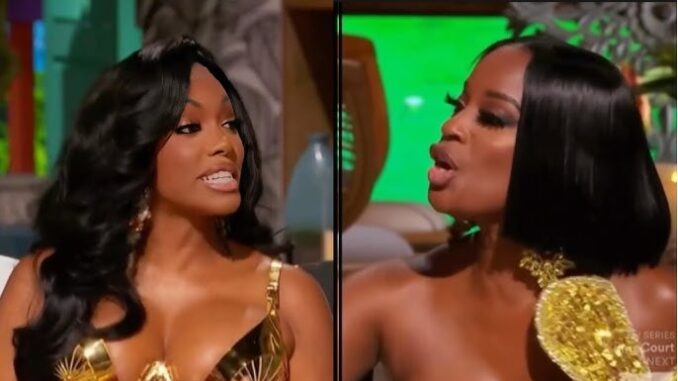
The air in the reunion studio always thickens, not just with hairspray and manufactured bonhomie, but with the palpable hum of unresolved grievances, poised to ignite. It is a carefully constructed pressure cooker, designed to bring long-simmering resentments to a boil under the glaring, unforgiving gaze of a dozen cameras. On this particular day, as the segment teetered on the precipice of utter chaos, it was Porsha’s turn to become the crucible, the vessel from which all the pent-up tension would spectacularly erupt.
The stage itself is a character in these dramas: a semi-circle of plush chairs, deceptively comfortable, arranged like a gladiatorial arena. Andy Cohen, the master ringleader, sits at the helm, his questions often surgical, slicing through pleasantries to expose raw nerve endings. For hours, Porsha had been in the hot seat, subjected to a relentless barrage of accusations, insinuations, and the rehashing of every slight, every misstep, every betrayal, real or perceived. Her composure, initially a tightly wound spring, had begun to fray, visible in the slight tremor of her hands, the almost imperceptible clenching of her jaw, the way her eyes, usually sparkling, now held a deep, simmering fire.
The tension wasn't a sudden explosion, but a slow, agonizing build. It began with clipped tones, escalated to pointed fingers, then morphed into overlapping shouts, each voice trying to drown out the other, a cacophony of accusation and defense. Porsha had parried, she had deflected, she had attempted to articulate her truth in a landscape where truth often felt mutable. But the relentless pressure, the collective weight of perceived judgment, was too much. It was the feeling of being cornered, of her very character being dissected under a microscope, with no room left to breathe.
Then came the final, exquisitely painful barb, a comment or accusation that transcended the usual reality TV theatrics and struck at something deeper, more personal, more unforgivable. It was the straw, not merely breaking the camel’s back, but shattering the entire carefully constructed dam. A gasp, a collective intake of breath from the other cast members, hung in the air like an electric charge. Porsha’s eyes, which moments before had held defiance, now flashed with pure, unadulterated rage.
It began subtly: a sharp intake of breath, a tightening of her shoulders, a shift in her posture that spoke volumes. The chair scraped against the polished floor as she pushed back, not slowly, but with a sudden, violent propulsion. There was no polite excuse, no measured walk. It was an involuntary flight, an animalistic need to escape the perceived cage. The microphone, still clipped to her clothing, was yanked free with a defiant tear, its cord flailing like a severed nerve.
Her strides were long, purposeful, each step resonating with the force of her fury. Her back was ramrod straight, her head held high, not in defeat, but in a raw, almost majestic act of self-preservation. The silence she left in her wake was deafening, a vacuum where the cacophony had been. The cameras, usually relentless in their pursuit, seemed to freeze for a split second, momentarily stunned by the sheer force of her exit. The other cast members, momentarily silenced, watched with a mix of shock, exasperation, and perhaps a flicker of understanding.
The thud of a distant door closing echoed through the studio, a final exclamation point on the dramatic departure. It wasn't just Porsha storming off; it was the physical manifestation of a breaking point, the inevitable consequence of sustained pressure. It was an illustrative moment not just of reality television, but of the human condition itself: the finite capacity for enduring emotional assault, the primal need to protect one's spirit, and the explosive release that occurs when composure finally, gloriously, shatters into a million pieces. The empty chair on the reunion stage, still warm from her presence, stood as a stark monument to the power of a single, definitive exit.